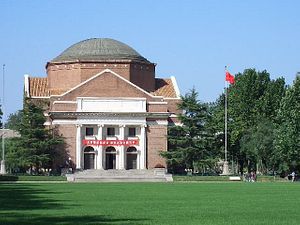In a surprising move, the most recent U.S. News & World Report ranking put China’s Tsinghua University ahead of the United States’ Massachusetts Institute of Technology as the world’s best engineering school. Together with the news that Chinese scientist Tu Youyou won the Nobel Prize in medicine, Tsinghua University’s ranking has led people to debate the rise of China’s educational system and its soft power.
Maybe one should be not surprised by Tsinghua’s success at all. It is not just Tsinghua that is moving upwards: several Chinese universities have surpassed traditional elite universities in Europe and Asia. Indeed, as the U.S. News & World Report’s Best Global Universities Rankings show, among the top 750 universities around the world, China has 65. Moreover, Chinese universities occupy five positions among the top 10 Asian universities ranked by the report. Chinese universities are expected to enter the global top 10 list in coming decades. As one Australian education expert explains, “When more Chinese journals are indexed by Thomson Reuters and when four million Chinese researchers start to cite one another, then we can expect Chinese universities to rapidly improve their position on various rankings.”
It’s not just paper citations that push Chinese universities upward. Prestigious Chinese universities’ global influence is rising fast too. For example, Tsinghua University has launched the Schwarzman Scholars program, with an aim to train the next generation of global leaders whose success must depend on a good understanding of “China’s role in global trends.” Already, 3,000 of the best and brightest from around the world have applied for the program and only about 100 would be selected, thus making the program one of the most competitive of its kind in the world.
Tsinghua University is not alone in this regard. Peking University has also announced its own program, called the Yenching Academy, which is already offering 10 English courses in the fall of 2015. Yenching Academy shares the Schwarzman program’s goal, which is to train the next generation of global leaders. The shared assumption of these two prestigious programs is that a global leader cannot be an effective leader without a deep understanding of China and its role in the world.
It would be misleading to just focus on Tsinghua and Peking as we examine the rising influence of Chinese universities. Indeed, Tsinghua is most famous for its science and engineering departments and this is why it is often called “China’s MIT.” Peking University has a long and proud tradition within Chinese higher education, as it has always been at the center of the country’s social and political developments since its establishment in 1898. Another university that is quietly rising in the rankings is Renmin University of China, which is often less noticed due to its strong focus on social sciences rather than science fields.
Indeed, if one only ranks social science, Renmin University is arguably China’s best university, even surpassing Peking University. For example, in 2015, Renmin University won 50 projects sponsored by the National Social Science Fund, the most among all institutes of higher education. Several departments at Renmin University, including history, law, and international relations, are often ranked number one in China. In recent years, Renmin University has also increased its international profile through its think tank efforts, evidenced by the Chongyang Institute under the leadership of its president, Chen Yulu.
Other notable examples of rising Chinese universities include Fudan University in Shanghai and Sun Yat-sen University in Guangzhou. All the above-mentioned universities have significantly increased their research funding for the coming decade.
To be sure, it would be misleading to judge a university’s quality solely by looking at the rankings. Still, one can argue that the rise of Chinese universities is not a surprising development, given the overall rise of China in the past three decades. Chinese universities still have a lot of catching up to do when compared with their American counterparts, especially with regards to independent thinking and autonomy. But don’t be surprised if you see some of them topping Harvard some day in the future.

































